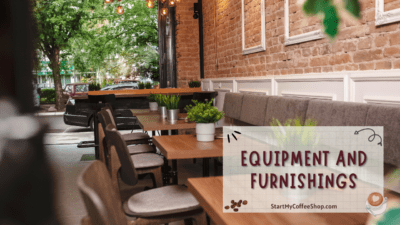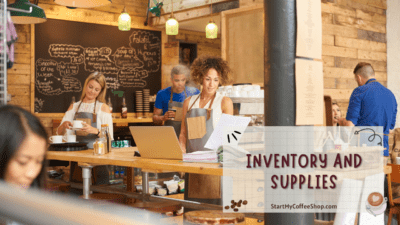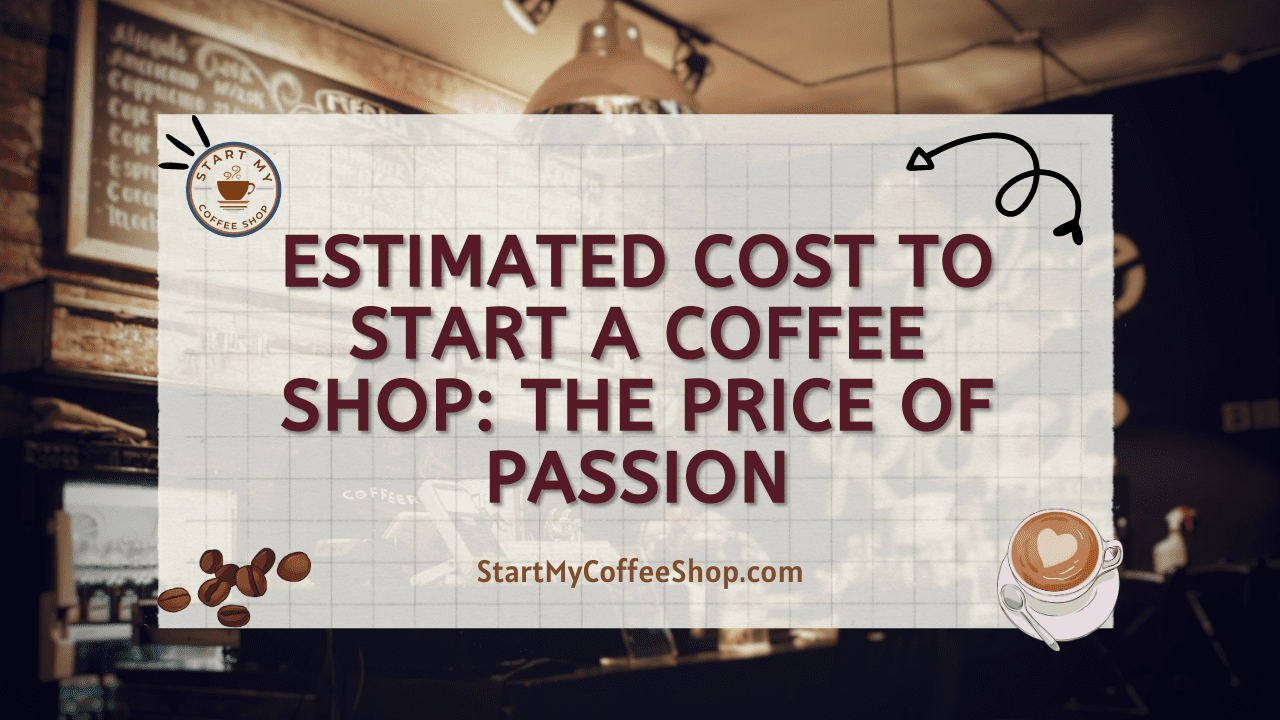Ah, the aroma of freshly brewed coffee, the sound of beans grinding, and the cozy atmosphere of a local café. If you’ve ever dreamt of owning your coffee shop, you’re not alone. Starting a coffee shop can be an exciting venture, but it’s important to understand the costs involved.
The estimated cost to start a coffee shop can vary greatly depending on factors like licenses, equipment, renovations, staffing, inventory, marketing, utilities, and contingency funds. And on average, it can range from $80,000 to $300,000 or more.
In this article, I will delve into the various expenses you’ll encounter on your journey to opening your very own caffeine haven.
Location
When it comes to starting a coffee shop, one cannot underestimate the importance of finding the perfect location. It is often considered the first and most crucial aspect of the entire process. The cost associated with renting or buying a space for your coffee shop can vary significantly depending on factors such as the city, neighborhood, and size of the establishment.
If you have your heart set on a bustling downtown area, be prepared for higher rental prices. These prime locations tend to attract more foot traffic and offer greater visibility, which can be advantageous for your business. However, the competition might be fierce, and you’ll need to carefully evaluate if the potential benefits outweigh the increased costs.
On the other hand, if you’re considering a quieter suburban location, you may find more affordable options. Rent prices tend to be lower in such areas, allowing you to allocate your budget to other crucial aspects of your coffee shop. However, it’s essential to assess the foot traffic in the area and ensure there is enough demand to sustain your business.
When choosing a location, it’s not just about the cost. Consider the overall vibe of the area and whether it aligns with your target audience. Are there other businesses nearby that can complement your coffee shop? Is it easily accessible for both pedestrians and drivers? These factors can significantly impact the progress of your venture.
Ultimately, finding the perfect location for your coffee shop requires careful consideration and weighing the pros and cons. Assess your budget, research the local market, and analyze the demographics of the area.
By doing so, you can make an informed decision that sets the stage for your coffee shop’s growth. Remember, location is not just an address—it’s a strategic move toward achieving your entrepreneurial dreams.
Licensing and Permits
When venturing into the world of coffee shop ownership, it’s crucial to navigate the realm of licenses and permits. Operating a coffee shop requires obtaining various legal authorizations to ensure compliance with health and safety regulations.
The specific permits needed may include health permits, food handling certifications, business licenses, and if you plan to offer alcoholic beverages, liquor licenses.
Health permits are essential as they demonstrate that your coffee shop meets the necessary health and sanitation standards. These permits ensure that you follow proper procedures for food storage, handling, and preparation, guaranteeing the safety of your customers.
Food handling certifications are often required to ensure that you and your staff have the knowledge and training to handle food safely. These certifications typically involve completing a food safety course and passing an exam to demonstrate your understanding of food safety practices.
Additionally, obtaining a business license is a fundamental requirement for legally operating any business, including a coffee shop. This license validates your business entity and authorizes you to conduct commercial activities within the designated area.
If you plan to serve alcoholic beverages, acquiring a liquor license is essential. This license permits you to sell and serve alcohol in compliance with local laws and regulations. The process for obtaining a liquor license can be more complex and costly than other permits, as it involves specific legal requirements and considerations.
The costs associated with licenses and permits will vary depending on your location and the specific requirements set by local authorities. It is important to research and understand the regulations and fees applicable in your area. Contact your local government offices or regulatory bodies to get accurate information regarding the costs involved.
While these licenses and permits may add to the initial investment required to start your coffee shop, they are essential for legal compliance and ensuring the safety and well-being of your customers.
Be sure to allocate a portion of your budget for obtaining the necessary licenses and permits, and consider it as a crucial step towards establishing a reputable and legally compliant coffee shop.
Equipment and Furnishings
The cost of acquiring these items can vary significantly depending on several factors. Basic equipment suitable for a small-scale coffee shop can be obtained for a few thousand dollars.

This includes entry-level espresso machines, affordable coffee grinders, and standard brewing equipment. While these options may serve your needs adequately, they might lack some advanced features or durability.
On the other hand, if you aim to establish a high-end or commercial-grade coffee shop, be prepared for a higher price range. Professional-grade espresso machines, state-of-the-art coffee grinders, and advanced brewing equipment can easily amount to tens of thousands of dollars.
Investing in such equipment can provide enhanced control over-extraction, consistency, and overall quality, appealing to coffee enthusiasts and connoisseurs.
When determining the equipment needed for your coffee shop, consider your menu offerings and target audience. If your focus is on specialty coffee drinks and intricate brewing methods, you may require specific equipment like pour-over setups, siphon brewers, or nitro cold brew systems.
Alternatively, if you plan to offer a simpler menu with a focus on efficiency, a reliable espresso machine, and batch brewing equipment might suffice.
It’s important to strike a balance between your budget and the quality of equipment you aim to acquire. Carefully research different brands and models read customer reviews, and seek recommendations from industry professionals to make informed decisions.
Consider factors such as durability, reliability, and after-sales support when evaluating the cost versus value proposition of each equipment option.
Read more about Cost to Startup a Coffee Shop: Unveiling the Startup Costs
Renovations and Interior Design
When transforming a space into a coffee shop, it’s important to consider the necessary renovations and interior design work. Converting a space to suit the needs of a coffee shop involves various aspects such as plumbing and electrical modifications, flooring, painting, and creating a cozy ambiance through decor and lighting.
The cost of renovations will depend on several factors, including the size of the space, the extent of modifications required, and your desired aesthetic. For instance, if the space is already equipped with adequate plumbing and electrical infrastructure, the costs may be relatively lower compared to a space that requires significant modifications to meet code requirements.
Flooring is another aspect that may require attention. Depending on your preferences and the condition of the existing flooring, you might choose to install new tiles, hardwood, or laminate flooring. Each option comes with its cost considerations, and the size of the space will play a role in determining the overall expense.
Creating a cozy and inviting ambiance is crucial for a coffee shop. This involves choosing the right decor, furniture, and lighting. The cost of these elements will vary based on your desired style and the quality of materials you select.
Comfortable seating, aesthetically pleasing artwork, and well-placed lighting fixtures all contribute to the overall atmosphere you want to create.
To keep costs under control, it’s advisable to have a clear vision of the desired aesthetic before starting the renovation process. Plan the layout of the space, research suitable materials, and suppliers, and obtain multiple quotes from contractors to compare prices.
Additionally, consider seeking professional advice from interior designers who specialize in coffee shop designs. They can help you make informed decisions about the renovation process, optimize the space, and create a cohesive and visually appealing environment.
Remember that renovations and interior design work are investments in creating a unique and attractive coffee shop. By carefully planning, budgeting, and making informed choices, you can transform your space into a welcoming and visually appealing destination for coffee lovers to enjoy.
Staffing and Training
Your coffee shop will likely need baristas who can expertly craft a variety of coffee beverages. Skilled baristas often command higher wages due to their expertise and ability to consistently deliver high-quality drinks. Additionally, you may need kitchen staff to prepare food items if your menu includes options beyond coffee.
It’s also essential to consider the need for servers if you plan to offer table service. Servers can enhance the overall customer experience by attending to patrons’ needs, taking orders, and delivering food and beverages to tables. Their wages should be factored into your staffing costs.
Training costs are another aspect to consider. Even experienced staff members may require training to familiarize themselves with your specific coffee offerings, equipment, and customer service standards. Investing in thorough training programs will ensure that your staff can confidently and consistently deliver exceptional service.
To determine the staffing costs for your coffee shop, research the local minimum wage requirements and average wages for coffee shop employees in your area. Consider the number of staff members needed to efficiently operate your coffee shop during peak and off-peak hours.
Remember to account for employee benefits and payroll taxes when calculating the overall cost.
Creating a positive and supportive work environment can contribute to employee retention and job satisfaction, which ultimately benefits your business. Encourage ongoing training and professional development opportunities for your staff to further enhance their skills and job satisfaction.
By carefully planning and budgeting for staffing costs, including wages and training, you can ensure that your coffee shop has a competent and motivated team capable of delivering excellent coffee and exceptional customer service.
Inventory and Supplies
One of the ongoing expenses for a coffee shop is stocking up on essential supplies such as coffee beans, milk, syrups, pastries, and other necessary items. To manage this expense, it’s crucial to estimate your monthly usage and calculate the cost of inventory accordingly.
Start by analyzing your sales data and understanding the demand for different products. This will give you an idea of the quantities of coffee beans, milk, syrups, and other ingredients you typically require every month. Consider seasonal variations and any special promotions or events that may impact your sales volume.
Once you have an estimate of your monthly usage, you can calculate the cost of inventory by multiplying the quantities needed by the unit cost of each item. It’s important to factor in any fluctuations in prices, especially for coffee beans which can be affected by market conditions.
To reduce the cost of supplies over time, it’s beneficial to build strong relationships with your suppliers. Cultivate partnerships based on trust and reliability, and explore the possibility of negotiating bulk discounts or favorable payment terms. This can help you secure better pricing and improve your overall profit margin.

Regularly review your inventory management processes to avoid excessive stock or shortages. Implement efficient ordering systems to ensure that you maintain an optimal level of inventory without tying up excessive capital in unused supplies.
Additionally, consider exploring local sourcing options for certain items. Working with local farmers or artisans can not only support the local economy but also provide you with unique and high-quality products at potentially competitive prices.
By accurately estimating your monthly usage, calculating inventory costs, and exploring opportunities for cost savings through supplier relationships and efficient inventory management, you can effectively manage the expenses associated with stocking up on coffee beans, milk, syrups, pastries, and other essential supplies for your coffee shop.
Read more about Cheap Coffee Shop Counter Design: Affordable Inspirations for a Coffee Shop Counter Makeover
Marketing and Advertising
After preparing your coffee shop to welcome customers, it’s time to focus on spreading the word and attracting a loyal clientele. Effective marketing and advertising efforts play a vital role in creating awareness and generating buzz for your coffee shop.
Key strategies include creating a compelling website, establishing a strong social media presence, designing printed materials, and organizing local promotions.
Building a professional and user-friendly website is crucial in today’s digital age. Your website should showcase your coffee shop’s unique offerings, menu, location, and contact information. Consider incorporating visually appealing images and engaging content that captures the essence of your coffee shop’s atmosphere.
In addition to a website, establish a strong presence on social media platforms that resonate with your target audience. Engage with your followers by posting captivating photos, videos, and updates about your coffee shop. Encourage user-generated content and respond to comments and inquiries promptly to foster a sense of community and build brand loyalty.
Printed materials like business cards, flyers, and menus are tangible marketing tools that can be distributed within your local community. Ensure that they reflect your coffee shop’s branding and highlight its unique selling points.
Partnering with other local businesses for cross-promotions or collaborating with community events can also be effective ways to gain exposure.
Allocate a specific budget for marketing activities to ensure that you can execute your strategies effectively. Consider the costs associated with website development, social media advertising, printing materials, and any sponsored events or promotions. Continuously evaluate the effectiveness of your marketing efforts and make adjustments as needed to maximize their impact.
Remember, effective marketing goes beyond just promoting your products—it’s about building relationships and creating an emotional connection with your target audience. Be authentic, consistent, and responsive to customer feedback. Encourage positive online reviews and engage in local community initiatives to establish your coffee shop as a trusted and beloved destination.
Utilities and Operating Costs
Electricity is vital for powering your coffee machines, lighting, and other equipment. Water is necessary for brewing coffee, cleaning, and maintaining hygiene standards.
Gas may be required for heating or cooking purposes, depending on your menu offerings. The cost of utilities can vary depending on the size of your establishment and the rates set by your local utility providers.
In addition to utilities, there are several other operating costs to consider. Insurance is essential to protect your business from unforeseen events such as accidents, property damage, or liability claims. The cost of insurance coverage will depend on factors such as the size of your coffee shop, the location, and the coverage limits you choose.
Permits and licenses also come with ongoing renewal fees. These include health permits, food handling certifications, and business licenses. It’s important to factor in these costs when budgeting for your coffee shop’s operating expenses.
Regular maintenance is crucial to keep your equipment in good working condition and ensure a smooth operation. This includes servicing coffee machines, refrigerators, and other key equipment, as well as addressing any repairs or maintenance issues promptly.
Additionally, waste disposal is an ongoing concern, and you may need to contract with waste management services for proper disposal of trash and recycling.
To effectively manage these expenses, keep track of your utility usage, monitor your insurance coverage, and create a maintenance schedule for equipment upkeep. Seek energy-efficient options to reduce utility costs in the long run.
Regularly review your insurance policies to ensure you have adequate coverage at the best possible rates. Plan for routine maintenance and repairs to prevent costly breakdowns and ensure the longevity of your equipment.
Contingency Fund

A contingency fund is an allocated amount of money specifically designated to cover unexpected costs and challenges that may arise during your business operations. This fund acts as a safety net, providing you with financial stability and peace of mind when faced with unforeseen circumstances.
These unexpected expenses can take various forms. It could be repairs or maintenance issues that arise with your coffee equipment, unforeseen repairs to the physical space, or unexpected regulatory requirements that demand additional investments. There may also be periods when revenue is lower than anticipated, such as during slower seasons or when facing unexpected market changes.
By establishing a contingency fund, you create a buffer that allows you to handle these challenges without compromising the daily operations or financial stability of your coffee shop. This fund should be separate from your regular operating budget and should ideally be set aside at the outset of your business venture.
The amount you allocate to your contingency fund will depend on various factors, such as the size and scope of your coffee shop, the industry you’re operating in, and your risk tolerance. It is recommended to consult with financial advisors or accountants who can guide you in determining an appropriate amount for your specific business.
Remember to periodically review and replenish your contingency fund to ensure it remains adequate. As your business grows and evolves, the potential risks and unexpected expenses may change, necessitating adjustments to the size of your fund.
Summary
While starting a coffee shop requires a significant investment, it’s important to remember that with proper planning and diligent management, it can be a fulfilling and stable venture. Estimating the costs involved in starting a coffee shop is essential for developing a realistic business plan and securing the necessary funding.
Consider the factors mentioned in this article, adapt them to your specific circumstances, and embark on your coffee shop journey with confidence.
Good luck, aspiring café owner, and may your brews be strong and your customers loyal!
Frequently Asked Questions

Question: Do I need a special license to open a coffee shop?
Answer: Yes. These may include health permits, food handling certifications, business licenses, and possibly liquor licenses if you plan to serve alcohol.
Question: How much should I budget for equipment and furnishings?
Answer: Basic equipment can cost a few thousand dollars, while high-end commercial-grade machinery can range from $10,000 to $40,000 or more.
Question: What ongoing expenses should I consider for a coffee shop?
Answer: Beyond the initial startup costs, ongoing expenses include staff wages, inventory and supplies, utilities (electricity, water, gas), marketing and advertising, maintenance, insurance, permit renewal, and contingency funds.
To learn more on how to start your own coffee shop checkout my startup documents here
Please note: This blog post is for educational purposes only and does not constitute legal advice. Please consult a legal expert to address your specific needs.

Hi! I’m Shawn Chun
My adventure in coffee began when I first launched my first coffee shop back in the early 2000s. I had to figure out so many things on my own and to make it worse within 2 years of opening two large corporate coffee chains moved in just blocks away from me!
As I saw smaller and even some larger coffee shops in the neighborhood slowly lose customers to these giant coffee chains and slowly close up shop, I knew that I had to start getting creative…or go out of business.
I (like you may be) knew the coffee industry well. I could make the best latte art around and the foam on my caps was the fluffiest you have ever seen. I even had the best state-of-the-art 2 group digital Nuova Simonelli machine money could buy. But I knew that these things alone would not be enough to lure customers away from the name brand established coffee shops.
Eventually, through lots of trial and error as well as perseverance and creativity I did find a way to not only survive but also thrive in the coffee/espresso industry even while those corporate coffee chains stayed put. During those years I learned to adapt and always faced new challenges. It was not always easy, however, in the end, I was the sole survivor independent coffee shop within a 10-mile radius of my location. Just two corporate coffee chains and I were left after that year. All told the corporate coffee chains took down over 15 small independent coffee shops and kiosks and I was the last one standing and thriving.
Along the years I meet others with the same passion for coffee and I quickly learned that it is not only “how good a barista is” that makes a coffee shop successful, but the business side of coffee as well.
Hence why I started this website you are on now. To provide the tools and resources for up and coming coffee shop owners to gain that vital insight and knowledge on how to start a coffee shop successfully.
Stick around, browse through my helpful blog and resources and enjoy your stay! With lots of LATTE LOVE!
Shawn







